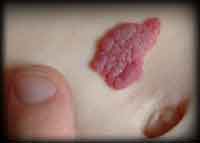 A
6-month-old female baby was brought to use a Hemangioma on the scalp
located at the vertex. A gradually increasing, benign tumurous
growth of the blood vessels was noticed when the child was 12 days
old, although the delivery had been normal. A
6-month-old female baby was brought to use a Hemangioma on the scalp
located at the vertex. A gradually increasing, benign tumurous
growth of the blood vessels was noticed when the child was 12 days
old, although the delivery had been normal.
There were no other noticeable symptoms.
In Dearborn’s book on skin diseases, Fluoric acid, Lycopodium,
Calcarea flour, cundurango, Belladonna, aconite are mentioned as
having pronounced capillary and vascular action. Lachesis has not
been mentioned anywhere. In this case, Lachesis was chosen on the
basis of its strong affinity for the capillaries and the bluish –
red appearance of the growth.
Homoeopathic Prescription
Lachesis 10 N was prescribed as 3 unit doses at every 10 minutes
interval. A fortnight later, it was seen that the reddish blue
colour was fading and the growth was paler now. The baby was kept on
placebo for 2 months during which the size of the tumor reduced
considerably. In between the baby developed itchy vesicular
eruptions on the scalp for which sulphur 200 was given once with
much relief. Lachesis 50 M followed it as the hemangioma was much
smaller and paler by then. The tumurous growth disappeared in about
6 months.
RECURRENT
BREAST ABSCESS
Presenting complaints:
Mrs. P. D., around 50 years of age , consulted us for recurrent
bilateral breast abscesses. The first abscess had appeared on the
right breast 20 years back, following a nursing injury while feeding
her baby. She took some allopathic treatment with temporary relief
but the abscess formation became recurrent involving even the left
breast. Abscesses were full of blood and pus
accompanied by an offensive discharge as well. Her skin in general
was unhealthy & would generally take a long time to heal. Her breast
was painful on pressure and was also worse from tight fitting
clothes. The right nipple had retracted with nodule formation in
both breast but she had not gone in for a mammogram which was
advised. Due to the recurrent infection, she felt feverish &
listless. On examination, there was a visible, mobile swelling on
the right side of the suprasternal notch.
Constitutionally, she also had a tendency to catch cold easily,
especially on exposure to draft of air or on getting wet in the
rain, which led to watery coryza also with sneezing. She had
resorted to some home homoeopathic treatment earlier for her
rhinitis which had helped her.
The patient
There was a history of serious mental trauma when her house was
robbed on two occasions in the past. One attack was about 25 years
ago and the was about 8 years back which had a major lasting
impression on her & consequently she became very quiet over the
years. She admitted that although she would often brood over her
troubles, she felt better she spoke out about her worries & also
preferred being in company.
Homoeopathic prescription
Based on her chilly nature and the offensive the offensive
discharge’ she was initially given Graphite’s 30 TDS for 3 weeks.
On her next
visit, the pain in the breasts nodules was slightly less. She had
developed slight fry couth especially worse in the morning and at
night since last few days with heaviness in head. all the sinuses
were tender especially more so over the right maxillary and frontal
ones. Investigation showed a rise in ESR up to 81 mm 1st hr. based
on the recurrent abscess & delayed healing, sinus inflammation &
sensitivity for cold, she was given silicea 30 qid on a regular
basis and was advised a breast mammogram.
After 15 days,
she came back with her mammogram report which was normal. On
examination, her sinuses were still tender and because of her
tendency to catch cold easily, this time she was given calcarea carb
30 for a week following by silicea 30 tds.
She came back after a period of 3 months and was quite happy to
report that this winter she did not have any any abscess formation
and pain in breast nodules was also better.
Although the pain in nodules kept recurring, with a reduced
intensity but thankfully she never had abscess formation again.
Calcarea carb 30 tds was repeated for a month and Belladonna 30 was
given as an acute remedy for pain. It is interesting to note that
Belladonna is also the acute of Calcarea carb. |
 A
6-month-old female baby was brought to use a Hemangioma on the scalp
located at the vertex. A gradually increasing, benign tumurous
growth of the blood vessels was noticed when the child was 12 days
old, although the delivery had been normal.
A
6-month-old female baby was brought to use a Hemangioma on the scalp
located at the vertex. A gradually increasing, benign tumurous
growth of the blood vessels was noticed when the child was 12 days
old, although the delivery had been normal.